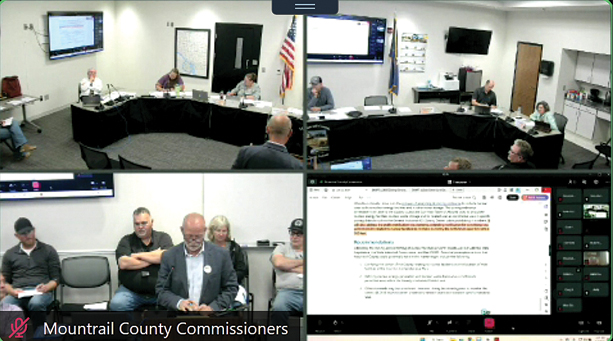County Continues Work On Data Centers And Battery Storage Facilities

The County Planning & Zoning steering committee continues working on the county’s ordinances for data centers and battery storage facilities with another meeting on Tuesday, Aug. 4.
Scott Harmstead of SRF Consulting presented the committee with the third draft relating to data center ordinances, saying that they have incorporated the comments from the last meeting.
That includes the review and separate permitting for associated infrastructure like electrical substations.
They have also updated the requirements for the application submittal to include a list of all property owners within one mile of the proposed development. It would also include identification of all water wells, both public and private, within the one mile zone and a soil analysis. They added the PSC to the state agency comments relating to the state transmission authority.
Setbacks have been set at one mile from residences and places where people congregate, including churches and schools. It must include proof of property owner acknowledgments.
They have also added setbacks of one mile for historical sites, noting that additional requirements may be provided from the state as the Historical Preservation office will also be included in notifications.
They set exclusions from any drinking water source area at 1200 feet. Exclusions will also be included for water protection areas as identified by the NDDEQ.
Verification will also be required for all setback requirements as mapped out within 1.5 miles of project areas.
There was discussion on water usage for these facilities including not just quality, but also quantity. There was also discussion about discharge, which will need to meet and comply with all NDDEQ requirements. They also discussed requiring notification or an affidavit of legal discharge so there is a record of when that occurs.
As for the section on foreign ownership, the committee stated that they need a list of all owners and contact information of those owners.
Discussing emergency management, they are looking at a limit of no more than 1,000 gallons of fuel located on site. They are also looking at requiring the facility operator be on-site for all emergency response operations.
Scott Iverson of MWEC addressed the committee’s discussions on the county being a third party beneficiary as relates to the power purchase agreements. He stated they have concerns over legalities and ramifications in the event there is a need to shut off power. He stated they would prefer this be managed with legal proceedings.
Committee member Charlie Sorenson also discussed the potential for increased power draws and rates as these data centers are built. He said that they are finding that the costs are being shed to all customers and he was concerned about how that affects residents who then bear the costs. He felt the county needs to be prudent in how they look at this.
The committee discussed that part of the comprehensive plan should be to assure reliability while making the companies responsible for their own studies and generating their own power where they are.
The committee also discussed options for finding industry members to answer the questions and concerns they have.
Harmstead then presented the second draft for the battery storage facilities, noting they have divided these into three different categories: minor residential, minor commercial and major commercial. They are looking at requiring the same setbacks as data centers. They are also looking at the sections on end of use, and compliance and enforcement.
The committee is also looking at a third issue as they move forward with these ordinances related to nuclear waste disposal. The last legislative session created studies for regulations as well as feasibility studies.
The county wants to be ahead of this issue as well. Harmstead said that while many of the issues will be state controlled, local jurisdictions can look at their regulations.
The issue of storage of nuclear waste was discussed in Pierce County. A USGS feasibility study was done nearly ten years ago.
Commissioner Trudy Ruland noted that her concerns are not just about storage locations, but also how the waste arrives at the location.
Harmstead said they are looking at ordinances and regulations in other states.
They are looking at putting the county’s stance into the comprehensive plan as they look to have their reasonings in place.
Troy Coons of the NW Landowners Association said that he helped work on the county’s comprehensive and vision plans and agreed that the first step regarding this issue is at the
(Continued on Page 4)
